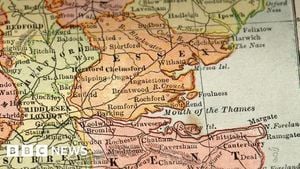The Israeli political landscape has entered a period of heightened tension and dramatic rhetoric following a decisive United Nations General Assembly vote on September 12, 2025, which overwhelmingly endorsed the so-called New York Declaration on the Peaceful Settlement of the Question of Palestine. The non-binding resolution, passed with 142 countries in favor, 10 against, and 12 abstentions, outlined a "tangible, time-bound and irreversible" path toward a two-state solution—explicitly excluding Hamas—and called for the recognition of a Palestinian state. The move, seen by many as a diplomatic watershed, has triggered fierce reactions at the highest levels of Israel’s government.
By the evening of September 13, top Israeli ministers were publicly calling for the immediate annexation of Judea and Samaria (the biblical names for the West Bank) in direct response to what they described as an international assault on Israel’s sovereignty. Finance Minister Bezalel Smotrich, a prominent figure on the right and also a minister in the Defense Ministry overseeing civilian affairs in the disputed territories, declared on social media, "The fact that a diplomatic attack on Israel is met with Israeli silence—is unacceptable and cannot continue." Smotrich urged, "Israel must apply Israeli sovereignty as a preventive measure against the reckless attempt to establish a terror state in the heart of our land." According to The Times of Israel, Smotrich’s post was emblematic of a broader right-wing surge, with several ministers echoing calls for annexation as a direct counter to the U.N. declaration and recent statements by Western governments like the UK and France, which have signaled intentions to recognize a Palestinian state later this month.
Justice Minister Yariv Levin went further, branding the U.N. decision "a reward for terrorism" and insisting that "a Palestinian state will never be established." He asserted, "The Land of Israel belongs to the people of Israel. Even the U.N. decision will not change that. It is time to apply sovereignty to Judea, Samaria and the Jordan Valley. This is the appropriate Zionist response." Levin’s words, reported by JNS and The Times of Israel, reflected a hardened stance within Prime Minister Benjamin Netanyahu’s government, which has long opposed Palestinian statehood on both ideological and security grounds.
Heritage Minister Amichai Eliyahu did not mince words either. Criticizing the U.N. as having devolved from "an organization that recognized the Jews’ right to a state in 1947 into a circus that rewards murderers," Eliyahu asserted that the institution is "not only irrelevant, it is dangerous." He called for its replacement and dismissed the notion of a Palestinian state, stating, "No invented state will arise for an invented people. There has never been a Palestinian state and there never will be." His remarks, cited by JNS, underscore the deep skepticism—and outright hostility—many in the Israeli government feel toward international efforts to resolve the conflict through statehood for Palestinians.
Just two days before the U.N. vote, on September 11, Prime Minister Netanyahu attended a high-profile signing ceremony in Ma’ale Adumim, a large settlement east of Jerusalem, committing government funds to the construction of two new neighborhoods and the expansion of a third. The most contentious aspect of the agreement is the planned development in the E1 area—a 12-square-kilometer tract of land long considered strategically vital by both Israelis and Palestinians. Netanyahu was unequivocal: "We said there will be no Palestinian state—indeed there will be no Palestinian state. This place is ours." As The Times of Israel notes, the E1 project is highly controversial; critics argue it would sever Palestinian East Jerusalem from the West Bank and make the creation of a contiguous Palestinian state nearly impossible. Despite support for building in E1 from every Israeli government since 1994, international pressure has kept the area largely undeveloped until now.
The Israeli government’s annexation rhetoric has not gone unnoticed by the United States. U.S. Ambassador to Israel Mike Huckabee stated last week, as reported by Channel 14 and JNS, that "Washington had never asked Israel not to apply sovereignty" in Judea and Samaria. Huckabee added, "The United States respects Israel as a sovereign state and will not tell Israel what to do. That’s also what Secretary of State Rubio said just last week." Secretary of State Marco Rubio, who arrived in Israel on September 14 for an official visit, told reporters that annexation was "something being discussed among some elements of Israeli politics" and declined to offer an official U.S. position. He did, however, issue a warning to countries considering recognition of a Palestinian state: "If you do it, you’re going to create really big problems." According to JNS, Rubio’s visit is intended to convey "America’s priorities in the Israel-Hamas conflict and broader issues concerning Middle Eastern security, reaffirming U.S. commitment to Israeli security."
Meanwhile, behind closed doors, the U.S. stance appears more nuanced. Axios reported that Israeli officials believe Rubio has privately signaled no opposition to West Bank annexations and that the Trump administration will not block such moves. Yet, a U.S. official cautioned that annexation could jeopardize the Abraham Accords—normalization agreements between Israel and several Arab states—and tarnish former President Trump’s legacy. This internal debate highlights the delicate balancing act Washington faces: supporting a key ally while managing broader regional stability and its own diplomatic achievements.
The international community, for its part, remains largely opposed to Israeli annexation. Israel’s presence in the West Bank, which it has controlled since the Six-Day War of 1967, is widely considered illegitimate under international law, with the U.S. under Trump’s previous terms being a notable exception. Recent polling suggests that a majority of the American public, including many in the Republican "Make America Great Again" movement, opposes annexation of the West Bank, adding another layer of complexity to the policy debate in both capitals.
As the dust settles from the U.N. vote, the Israeli government faces mounting pressure from both domestic hardliners and international critics. Netanyahu’s government, emboldened by right-wing ministers and what they perceive as tacit American approval, appears intent on pushing forward with settlement expansion and possible annexation—moves that could fundamentally reshape the Israeli-Palestinian landscape for years to come. The coming weeks, as Secretary Rubio’s visit unfolds and Western governments weigh recognition of a Palestinian state, promise to be pivotal in determining whether rhetoric turns into irreversible action.
For now, the world watches as Israel stands at a crossroads, its leaders weighing sovereignty, security, and the ever-elusive promise of peace against the backdrop of a region where every decision echoes far beyond its borders.




